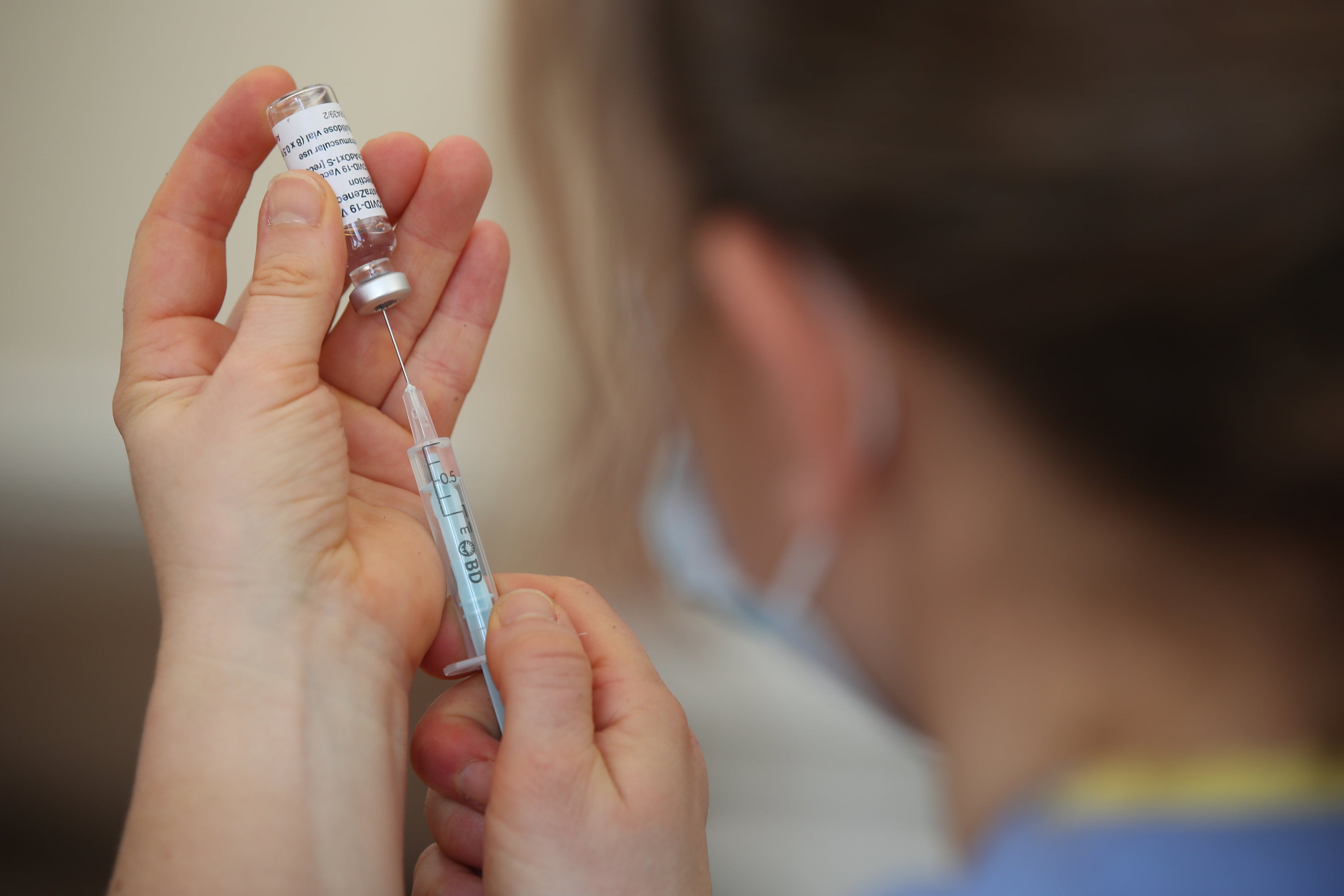How undocumented migrants are blocked from booking Covid vaccinations
Special Report: Investigation reveals hundreds of thousands could be unable to register with a GP – stopping them from easily accessing a coronavirus jab. May Bulman, Rachel Hamada, Emiliano Mellino and Vicky Gayle report


Your support helps us to tell the story
From reproductive rights to climate change to Big Tech, The Independent is on the ground when the story is developing. Whether it's investigating the financials of Elon Musk's pro-Trump PAC or producing our latest documentary, 'The A Word', which shines a light on the American women fighting for reproductive rights, we know how important it is to parse out the facts from the messaging.
At such a critical moment in US history, we need reporters on the ground. Your donation allows us to keep sending journalists to speak to both sides of the story.
The Independent is trusted by Americans across the entire political spectrum. And unlike many other quality news outlets, we choose not to lock Americans out of our reporting and analysis with paywalls. We believe quality journalism should be available to everyone, paid for by those who can afford it.
Your support makes all the difference.Hundreds of thousands of undocumented migrants face being blocked from booking Covid vaccinations, it can be revealed, because GP surgeries are refusing to register them – in breach of official guidance.
The NHS tells patients to sign up for Covid jabs through their GP – or, if booking online, requires them to provide their NHS number, which would normally be issued by a GP. But an investigation by The Independent and the Bureau of Investigative Journalism has found that fewer than a quarter of all GPs across Britain would register someone without ID, even though NHS England policy states that documentation is not required.
When approached to register a dummy patient who could not provide ID documents or proof of address, some 62 per cent of surgeries refused altogether, while 14 per cent said they were unsure whether they could.
Ministers said in February that everyone would have access to vaccines, “regardless of immigration status”. But our findings indicate that, with up to 1.2 million undocumented immigrants in the UK, hundreds of thousands are unable to register with GPs and therefore cannot book a jab, leaving them more vulnerable both to the coronavirus and to the wider effects of the pandemic.
Experts said this risked undermining the vaccination rollout, blaming “structural and institutional barriers” to healthcare stemming from the hostile environment policies designed to block access to services.
One woman with insecure status – a domestic worker and suspected victim of modern slavery – told The Independent she had been turned away three times since March 2021 when trying to register with GP surgeries, because she could not show documents.
I take it she’s not planning to go back to her own country any time soon?
“Each time they said no and asked for my documents I felt more afraid,” said the woman, who is being supported by charity Voice of Domestic Workers. “I tried to explain that I needed to register to get a vaccine, but they kept saying it wasn’t possible.”
There are several reasons why insecure migrants might end up without proof of address or ID: their documents may have been lost during their journey to the UK, or stolen as part of abuse they have suffered since arriving in the country.
Undocumented migrants are prohibited from having UK bank accounts or renting, so they are also unlikely to be able to produce bank statements or tenancy agreements.
Shut out of the system
Our investigation found that many practices also provided incorrect information for undocumented patients trying to register. One surgery, in Luton, told a caller trying to register a dummy patient: “She won’t be able to get vaccinated until she’s got an NHS number,” while a surgery in Birmingham said: “We wouldn’t be able to administer the vaccine if she hasn’t got UK status.”
In Coventry, they were asked: “I take it she’s not planning to go back to her own country any time soon?” and then: “Unless we’re advised otherwise, which we haven’t been until now, then there’s no facility for her to be vaccinated if she’s not got an NHS number.”
Anna Miller, head of policy and advocacy at Doctors of the World UK, which works to ensure those without immigration status can access healthcare, said the vaccine rollout had highlighted existing issues with the system.
“This reflects our day-in, day-out experience. The vaccine programme has shown not only that people don’t have access to primary care, but that they’ve been completely outside of the healthcare system,” she said.
Having a large proportion of the undocumented population unvaccinated presents both risks for their own health – particularly as these individuals are often in jobs that involve exposure to others – and a risk to public health, said Ms Miller.
Read more special reports from our Supporter Programme
“It risks undermining the whole vaccine programme and our shared protection from Covid and new variants,” she said.
Shadow immigration minister Bambos Charalambous said it was “wrong-headed” of the government to deprive anyone of vaccination, and called on ministers to “ensure that nobody is left out”.
Luton was the area in which GP surgeries were least likely to register an undocumented person, with none of the surgeries contacted agreeing to register the dummy patient. Those in Manchester were most likely to register patients, though the figure was still lower than 50 per cent.
In 113 of the calls, surgeries were asked whether they could suggest alternative vaccination options for the dummy patient. Over half of these surgeries said that they did not know any alternative options, or that the patient would not be eligible to receive the vaccine, either because they did not have an NHS number or because of their immigration status.
Patchwork solution
The other option for undocumented migrants is to attend a walk-in vaccination centre, where they do not need to be registered with a GP or provide proof of address, but these clinics do not exist in all areas as there is no obligation for local authorities to provide them. Experts say the “patchwork nature” of the provision means it does not present a complete solution.
Sham, a live-in domestic worker from the Philippines who has lived in the UK since 2018, tried to register with a GP for the first time in March 2021. Since her initial six-month visa expired, the 30-year-old has not had immigration status, and she says her abusive former employer still has her passport.
She said: “I travel to and from my work each day. I was thinking, I really need this vaccination. I was thinking that if I got Covid, I couldn’t work; how would I feed my family back home?”
WORST-AFFECTED AREAS
Percentage of GPs that failed to register a dummy undocumented patient
- Luton – 100%
- Slough – 90%
- Coventry – 88%
- Glasgow – 83%
- Brent, north London – 80%
When Sham, whose name has been changed to protect her identity, called her local surgery, she says she was asked to provide documents to “prove she was not illegal here”. When she told the receptionist her passport had been taken by an abusive employer, she was turned away and told to return when she could present ID.
She tried again, twice, but received the same response each time. Eventually, she travelled for three-and-a-half hours to a walk-in clinic in Tower Hamlets, east London, last month.
“I felt really scared, but I didn’t want to give up. The journey was long but that was my only option,” she said.
The Tower Hamlets clinic has had a “no questions asked” policy since 19 June. On the day it opened, around 1,000 people came from across London and beyond to get a jab.
Tracy Cannell, chief executive at Tower Hamlets GP Care Group, said that of those vaccinated on the day it opened, 80 per cent chose not to give their details, indicating that they were likely to be undocumented.
“These are people who don’t want to stick their head over the parapet,” she said. “It’s the hidden group that we know far less about. They want the vaccination to be safe – but they also want to be safe in other senses.”
Hostile environment
Experts say that some undocumented workers are put off trying to get the vaccine at all because of the fear generated by the government’s hostile environment policy, which introduced a set of measures in 2012 to block access to basic services for people without immigration status in the UK.
One of these was a memorandum of understanding between NHS Digital, the Department of Health and the Home Office that meant patients’ data could be shared and potentially used to identify people for deportation. This was stopped in 2018, but the fear remains.
Dr Deepti Gurdasani, clinical epidemiologist at Queen Mary University of London, said there were “clearly structural and institutional barriers” to ensuring that everyone can access vaccination – and that this was “very much” a result of the hostile environment.
Earlier this year, vaccines minister Nadhim Zahawi assured parliament that because there was no charge for the vaccine for people living in the UK, no proof of residence or immigration status was needed.
Responding to our investigation, a government spokesperson told The Independent that Covid vaccines were “available to every adult living in the UK”, and that the government was working closely with the NHS and local authorities to contact people, including migrants, who were not registered with a GP or may not have an NHS number, to ensure they were offered a jab.
But Dr Gurdasani said this was nothing more than an “empty statement”, and that the government had done “very little” to make sure vaccines were offered to all. “The reality on the ground is very different,” she added.